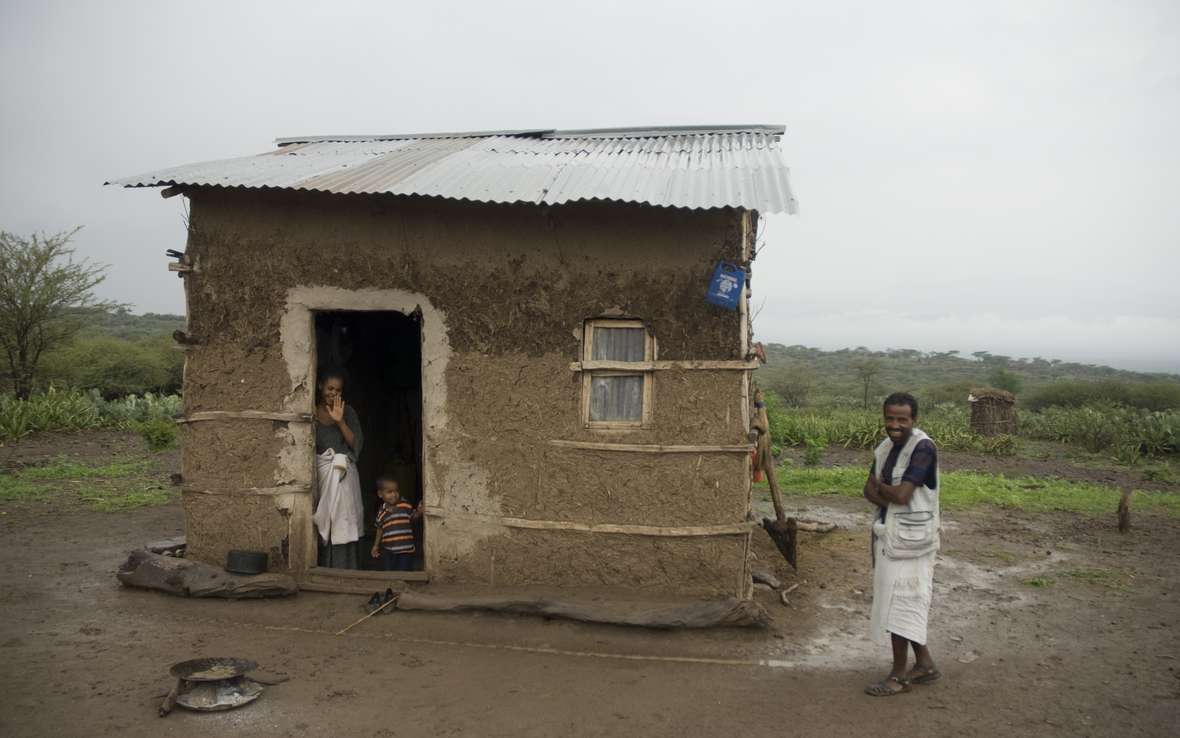Alemu Tadesse, a 30-year-old farmer in the Tigray region of Ethiopia, counts among his possessions two oxen, a cow with a calf, four sheep, and a donkey.
The pair of oxen alone puts him ahead of many poor farmers in this northern part of the country. Harnessed as a team, the animals give Tadesse the power he needs to plow his fields in a timely manner and to be ready for the rains when they fall. But if they don’t come, he’s now experimenting with a tool that will soften the blow: weather insurance.
Tadesse, who lives in the village of Hade Alga, is one of the more than 13,000 small farmers who are participating in a new insurance initiative launched by Oxfam and a host of partners, including the Relief Society of Tigray, or REST. The program allows those too poor to have cash on hand to pay for the insurance by working on environmental improvement projects that benefit the whole community—like planting trees. Tadesse is among the small percent of farmers able to pay with money.
When rainfall drops below a predetermined threshold, insured farmers receive a payout helping them to recover some of their losses from a failed or severely curtailed harvest.
“Everyone in this community is starting to understand the rationale of the insurance, so we want to continue this practice,” said Tadesse, sitting with his wife and two young children in their one-room home on a rainy morning in August. But he admitted that the idea took a little getting used to. “We were skeptical when we heard (about )it. We were even confused. How can you cover the loss of crops? It’s god’s work.”
After a great deal of discussion among community members, and many questions for REST, the idea began to click with people, Tadesse said. The local belief system holds that if you expect good things to happen, they will, and farmers are beginning to embrace insurance as part of that thinking, he added.
In 2010, Tadesse spent 60 birr—or about $3.50—on insurance for his teff, a staple grain in Ethiopia. As it turned out, the rains were plentiful that year and his harvest was very good, negating the need for a payout. But that didn’t stop him from doubling his investment in insurance the next year, paying 120 birr for a premium that would provide him with 400 birr—or $23,17—to cover his potential losses. The expense felt like a smart move.
“Anything can happen,” said Tadesse. “As security for me, I decided to double it. Even in the future I may double it again. You wish for better (rain), but you also have to accommodate the worst. In the future I don’t know what will happen, so that’s why I’m paying. But if the rain is good, I don’t regret paying that amount of money.”
The insurance has given him a sense of greater security, too, Tadesse said, so much so that he now has the confidence to take out a loan for livestock production. Once the rainy season ended, he planned to borrow money to buy a small herd of sheep and goats.
“If you buy four or eight sheep, they’ll reproduce in a short period of time,” said Tadesse. “It’s a good source of income for my family. It makes our life comfortable.”
With the stability he is striving to create for his family—in an environment made increasingly uncertain by changing weather patterns—Tadesse said he hopes his children will go far in school, an opportunity that stopped for him after fifth grade when he had to quit to work on his family’s farm and help care for his aging parents.
“I’m very confident my children will go further—up to where they can reach,” Tadesse said. “Education helps you use your capacity, not only in farming but in trading—in every part of life. If you’re educated you introduce new ideas into your agricultural practices. You analyze the future. It all needs education.”
And with the bit of security insurance is now providing, the dreams Tadesse has for his family have moved a little closer. Soon, other small farmers in Africa will have a chance at greater security, too: The weather insurance program, now called the Rural Resilience Initiative, or R4, is set to expand into Senegal and two other countries in partnership with the World Food Programme.
